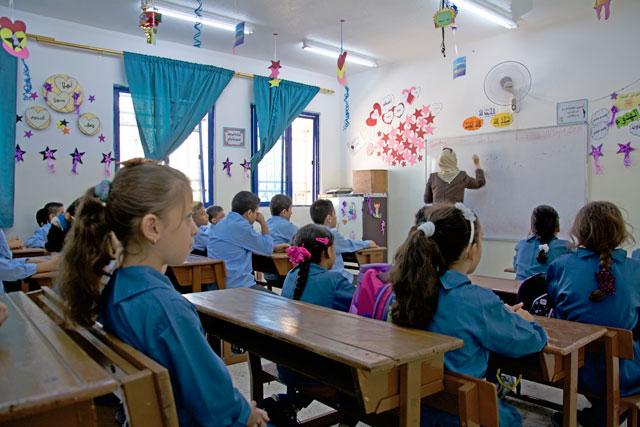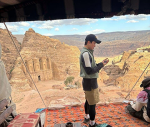You are here
Starting with Irbid, campaign seeks wage equality for female private schoolteachers
By Laila Azzeh - May 12,2015 - Last updated at May 12,2015
AMMAN — If it were not for a newly launched community-led campaign, female teachers at private schools would have had to wait for divine intervention to address the injustices they face, according to educators.
With around 64 per cent of women teachers paid the minimum wage — JD190 — or less, educators at private schools find themselves “enslaved despite their critical role in rearing the young generation”.
“The breaches in the sector are countless. You can barely find a private schoolteacher who has never suffered a nervous breakdown,” a private school teacher from Irbid told The Jordan Times on Tuesday.
For years, primary schoolteachers were paid JD40, an amount that was reduced to JD35 after the Social Security Corporation (SSC) subscription was deducted, she said.
“The principal used to make us sign that we were paid JD120, but the actual amount we received was JD40,” noted the teacher, whose name was withheld for protection.
Moving to another school was not the answer for the educator’s problems as she was only paid JD160 at another school and faced other difficulties — having to deal with the “pressure to remain silent over the injustices and giving higher grades to students to please parents”.
Currently unemployed, the diploma-holder, whose certificate does not allow her to continue teaching under new Education Ministry regulations, is now raising her voice for other teachers.
“It is the culture of fear, the need for any source of income and unawareness of the law that make teachers choose to go with the flow.”
Despite being paid the minimum wage, another private schoolteacher from Irbid said she suffered from the “twisted” means the owner used to ensure maximum profit.
“He used to fool us [teachers] into resigning at the end of each scholastic year on the pretext that this is stipulated by law and then rehire us after the end of the summer vacation. I then discovered by coincidence that this was done so he can reduce our social security subscription to nine months instead of 12,” she said.
“It is time now to stand for our rights. It is time to say enough is enough.”
The two teachers are now activists in the “Stand With Teachers” campaign, which was launched on Saturday.
The initiative is adopted by the National Committee for Equal Pay, and headed by the Labour Ministry and the Jordanian National Commission for Women (JNCW), with the support of the International Labour Organisation (ILO).
According to experts from these institutions, the gender pay gap reaches around 41 per cent in the private education sector in Jordan.
As the number of private schools in Irbid is huge, ranking second to Amman, and the violations are “many”, the current target of the initiative is the northern governorate.
“The committee has examined the main sectors with the highest gender pay gap and maintained that they are health, private education and light industries,” Reem Aslan, pay equity consultant at the ILO, told The Jordan Times.
Because women constitute the “majority” in the private education sector, the campaign targets them, adopting the “community organisation model” to influence change, an approach widely followed for interventions that are meant to produce tangible outcomes, according to Aslan.
Conducted with the help of teachers, the campaign will raise awareness on the importance of collective contracts and push for raising teachers’ salaries to reach at least the minimum wage in cooperation with the SSC and the Jordan Teachers Association.
“Having these institutions with us, along with inspectors from the Labour Ministry, is enough to address nearly 80 per cent of the problems in the sector,” Aslan noted.
Eman Okour, head of the ministry’s economic empowerment division at the women’s labour department, agreed, highlighting that “infringements in the sector make it seem that they are committed in a country with no rule of law.”
“Teachers have no idea about their rights. Even those who are aware prefer to remain working in spite of their suffering because they know others will accept their jobs,” she noted.
“We want the Stand With Teachers campaign to turn the matter into a public opinion issue,” Okour said.
Although the Kingdom ratified the ILO Equal Remuneration Convention in 1966, the organisation’s committee of experts entrusted with examining Jordan’s application of the convention maintained in 2013 that national laws and regulations contradict international standards.
The national regulations lack provisions that prohibit gender discrimination at work or stipulate the right of equal pay for equal-value jobs, the committee said.
Private School Owners Association President Munther Sourani said the syndicate fully supports the campaign, stressing that no school should be established without taking the rights of teachers into consideration.
“However, it is a vicious cycle. The economic situation of parents does not allow schools to increase fees to the level that enables them to pay good salaries to teachers. The situation requires massive restructuring, but schools should at least pay teachers the minimum wage according to the law,” Sourani told The Jordan Times.
Founded in 2011, the National Committee for Equal Pay is part of efforts to establish a strong institutional framework for action on pay equity, generate evidence-based policies and action, and undertake legislative amendments to close the gender pay gap in the country.
Pay equity is a priority in both the 2011-2015 National Strategy for Women and the National Employment Strategy.
It aims to overcome the underpayment of jobs frequently held by women and to advance women’s participation in the labour market.
Related Articles
AMMAN – Violation of teachers’ rights at private schools continues to be “flagrant”, but thanks to a community-led campaign, educators are “
AMMAN — The National Committee on Pay Equity (NCPE) on Saturday held the first social dialogue session on the collective bargaining agreemen
AMMAN — After enduring years of “flagrant” violations, private school educators will now enjoy better job security thanks to a new decision

















